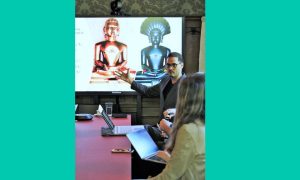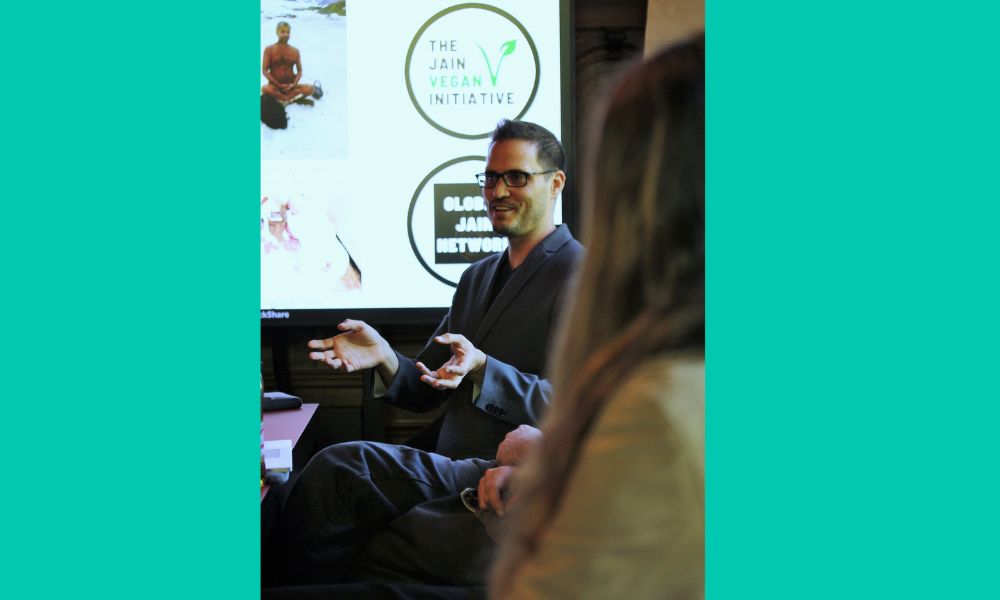If you ask Arihanta Institute’s professors, there’s no question about whether compassion, nonviolence, and advocates who embrace ahimsa — or non-harming — can lead to powerful and long-lasting change.
Those ancient principles helped topple a dictatorial regime in India during Mahatma Gandhi’s life and the Jim Crow South in the United States while Martin Luther King Jr. lived.
They also can help today’s animal advocates be part of compelling, change-making advocacy while also helping advocates take care of themselves and live aligned with their own highest values, said Professor Christopher Miller, the Institute’s vice president of academic affairs.
Miller teaches courses on animal advocacy and Jain dharma — a Sanskrit word that he said translates loosely to law, virtue, or responsibility — as well as Jain responses to climate change, both of which recognize the interconnectedness of all things, at Arihanta Institute.
The online, nonprofit educational institute encourages nonviolence toward all forms of life to the highest degree humanly possible, with courses designed to empower people to align their daily actions and lifestyle choices with their highest values.
Miller spoke with LFT about his own journey toward a compassionate and vegan lifestyle, how Jain principles can inform effective advocacy for animals, and why — when we exist in a fast-paced and often cruel and unforgiving world — nonviolence must be the path forward. Answers have been edited for length.
To learn more about Arihanta Institute, which is currently in the process of becoming accredited, or sign up for one of their courses, you can visit their website here. The Institute also offers an online Masters Degree in Engaged Jain Studies, which involves courses in Jain animal advocacy; you can learn more about that program here.
A Q&A with Arihanta Institute’s Professor Christopher Miller

Christopher Miller (Courtesy of Christopher Miller; Photo Credit: Michaela Blaser)
Can you tell us more about your exposure to Jainism, animal advocacy, and a vegan lifestyle?
I had taken an undergraduate class on Indic religions, which included Hinduism, Buddhism, and Jainism. One of my assignments was to write a paper on ahimsa (nonviolence). It was the first time I had been exposed to the concept. I had grown up in California eating a meat-heavy diet. And even when I was writing the paper, there was a spider on the wall, and my first instinct was to kill the spider. (I didn’t; I took the spider outside.) That was what I call a “seed experience”; I would work all of my 20s on my own accountability.
During the Indic religions class, which took place during 9/11, I remember watching the towers go down, and what a huge wake-up call that was for everyone that we (as people) were experiencing a huge crisis of violence.
I have always been a seeker, wanting to know why we are here and not having a means to answer those questions. The class and introduction to the Indic traditions made me question (things), including to question how we treat animals. I knew there was more that I could be. Thankfully, my advisor in college knew about Jainism and also was a vegetarian.
Why is it important for people to carve out the time in their busy schedules to reflect on the way they’re living?
What we’re doing to each other, what we’re doing to animals, and what we’re doing to the climate is going to have a direct impact on us. That is a selfish reason for reflection, but we should reflect on what values we’ve inherited and why we think the way we do. If we don’t, it’s not going to only affect us; it’s also going to affect our children, grandchildren, everyone. Also, of course, reflecting leads to understanding that in order for us to do well, everyone else has to do well — not just humans, but non-humans. Everything matters. That should provide enough motivation for us to reflect. We can start by carving out just an hour a week, and that can lead us deeper into finding a holistic way of life and a philosophy for a well-lived life.
Tell us more about the Jain principle of ahimsa and how it applies to animal advocacy and veganism.
Jains recognize that some harm is inevitable, but there is so much we can avoid, and compassion has to be the way forward because violence is going to beget more violence.
The Jain tradition is famous for holding ahimsa (non-violence) to the highest practice in everyday living. It starts from the points that nothing wants to experience pain, and everything wants to live. In this tradition, if you harm something else, you will harm yourself, and it will come back — that’s the concept of karma.
Why are Jains, historically, for thousands of years, vegetarian? It’s for this reason. What you’ll hear from Jains is that it may have been okay, at one ancient time, to eat dairy — like in ancient India, maybe it wasn’t as violent (although some Jain texts do say it maybe isn’t the best idea). But today, given the industrial dairy that everyone consumes inevitably, it’s no longer acceptable. Now, a lot of Jains are transitioning to veganism from vegetarianism.
“Arihanta” translates loosely to “enlightened soul.” In your experience, how does that enlightenment process start? And how can you maintain it?
It starts with a moment. In the Jain tradition, this (the Sanskrit word is Samyag-darśana) is actually an important experience to have. It basically means that suddenly, through your study or an experience, you have an insight into the true nature of reality, which is basically that nothing wants to hurt or experience pain. It is a moment of compassion for all living things.
That moment is only open for a short time, and then it closes. The question then becomes what do you do with that moment of insight that you had? Do you just go about business as usual, or do you dive in deeper and try to find out what just happened there?
What the Jain tradition would say is to remain true to that original experience, because that experience — and I see it more in the vegan and social justice movements than anywhere else — is the fundamental human insight, this idea that leads to the principle of ahimsa.
If you follow it, you might become vegetarian or vegan to honor that experience. Then, what often happens is we expect other people to understand what that experience was. So when I tell people that I’m vegan, including people I’m close to (laughs), the response we get is the exact opposite of what we would expect. We get the blowback and the retaliation.
There is direct instruction in Jain texts to avoid the company of people who live in delusion. Of course we’re not going to abandon our friends or family. But there is advice to surround yourself with others who have had that experience and are supporting each other in the ethical outcome.
The three pieces are you have the experience, you pursue it to know what it was, and you align your behavior with it. These are the “three jewels” of Jainism: correct worldview, correct knowledge, correct behavior. The last piece is the hardest part, but the Jain tradition gives you a whole host of things you can do, and should do, to align your behavior with that experience.

Ranakpur, a famous Jain temple (Courtesy of Christopher Miller; Photo Credit: Harsh Shah Gowani)
What are some actions that Jainism says will contribute to a “well-lived” life — especially when our planet is in crisis with climate change?
I teach a course on what the Jain tradition can teach us in response to climate change, and it’s free. I cover three main things in that course — easy things that we can change right away to make a huge impact.
One is what we eat. There’s a whole section on climate science that covers the effects of animal agriculture on the climate, which we know — alongside fossil fuels — is substantial and probably underestimated. Jainism advocates for eating the least violent diet possible, which we know today is veganism.
The second thing is consumption and waste: Energy (in the house and for fossil fuels) is huge: plastic, clothing, these things add up to a lot. I try not to buy much. In addition to ahimsa, the Jain tradition asks us to practice non-possession. That doesn’t mean that you give everything up, but we know we can seriously limit the amount of things we are consuming and that we don’t need as much as we think we do.
The last one is traveling by plane: It has a tremendous and unnecessary impact on the climate.
Following Jain principles, you can realize your highest human potential if you are willing to be vegan, cut back dramatically on your consumption, and you’re willing to cut back on flying and things you don’t need to do. It’s a spiritual experience when you are able to practice those things over a long period of time. What happens as a result of that is the extreme peace and contentment that comes from living a life like that, which will far exceed any satisfaction you will get from any of those other things in excess.
Do Jain principles, as you teach them, applaud small starts to these big lifestyle changes?
I try to explain these principles from my own life experiences: experiences in India, experiences with being vegan (and vegetarian before that) to show my students what I think is possible. There always will be a handful of students who have been nodding the whole time who will come and say to me, “I just wanted to tell you I became vegetarian or vegan.” But I also have students who will raise their hand and say, “This is really hard for me. My whole family eats meat.” — and I appreciate their honesty.
My encouragement, my response, is to tell them, “Look, this didn’t happen to me overnight.” It’s a gradual process of reflecting on what’s happening and realizing the urgency here. I encourage them to try. When you do try — say, going vegan or vegetarian for a month — you then realize the harm you were causing when you weren’t. That just naturally happens.
The Jain tradition (and the yoga tradition) would say that you have to honor your own experience. Try, and let the experience shape you. So I like to let my students have their own experience.
Most people are going to struggle with thinking this is too hard, or this is not possible, even though it’s necessary. But it’s worth trying. Commit yourself to a 3-month experience: Go vegetarian. Go vegan. Then trust the experience of compassion and what it feels like to extend that compassion to all life.
What can you share about the importance of having a self-care routine to keep advocates centered in compassion?
I have a regular, ongoing practice of some sort. Sometimes it’s long; sometimes it’s short. But consistency is the key. It’s good to have a psychosomatic practice that can bring you back into the moment and your body to recover a sense of self and wholeness — like yoga. A little bit each day is better than nothing, even if that’s some deep belly breathing for 10 minutes, or a bit of yoga, or a yoga class a couple times a week. It will make a tremendous difference with all the stressors we undergo.
If you’re in a state of trauma or desperation, don’t beat yourself up for not doing self-care. That’s another important thing. We have to forgive ourselves for the times when we can’t. But yoga and the Jain tradition do have tools to help you.


